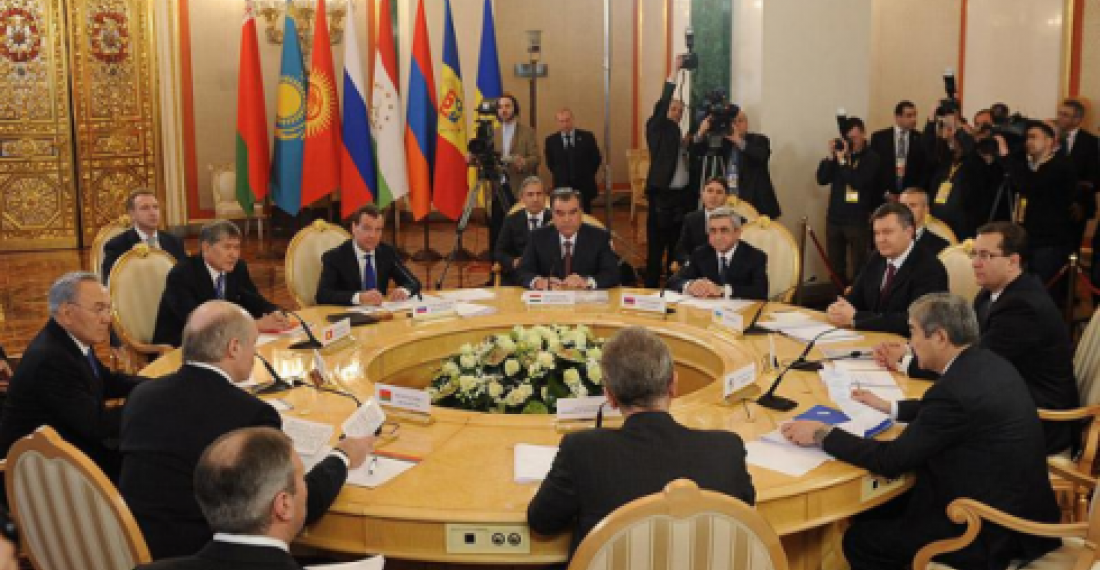Заседание Межгосударственного Совета ЕврАзЭС, Евразийского экономического сообщества, состоявшееся вчера в Москве открыло путь к созданию таможенного союза и единого экономического пространства с 1 января 2015 года. Но прозвучали предупреждении и для тех, кто решил остаться в стороне.
Президент России Дмитрий Медведев заявил после встречи: "Мы говорили о том, что создает Таможенный союз: и о преимуществах, и об определенных сложностях, которые могут возникнуть и уже возникают у государств, которые не являются членами ТС." Медведев в частности обращался к Армении, Молдове и Украине - три члена-наблюдателя ЕврАзЭС, лидеры которых также присутствовали на саммите. Страны, которые имеют статус наблюдателя в ЕврАзЭС выиграют от вступления в Таможенный союз, по словам Медведева.
В октябре прошлого года премьер-министр России Владимир Путин призвал Украину забыть о "политической фобии прошлого, смотреть в будущее", и присоединиться к Таможенному союзу. Украина же до сих пор сопротивлялась давлению со стороны России и предложила двусторонние договоренности с ново созданным Таможенным союзом вместо членство в нём, вариант, который был отвергнут Россией. Первый вице-премьер Украины Валерий Хорошковский заявил, что Украина перейдет на другие рынки, если она столкнётся с торговыми преградами с соседними странами.
Правительство Молдовы также не рассматривает вопрос о присоединении к Таможенному союзу в соответствии с заявлением министра иностранных дел Молдовы, Юрие Лянкэ, сделанное для ИТАР-ТАСС в понедельник в Вашингтоне. По его словам, проводя на курс на интеграцию в европейские структуры, нынешнее правительство в Кишиневе в то же время "четко обозначило наше понимание интересов" Молдавии на постсоветском пространстве.
Однако, позиция Армении еще не полностью выяснена. Армения имеет сильные экономические связи с Россией. Руководство Армении традиционно склонялось к России в принятии всех важных решений, и Армения является членом российской организации по безопасности ОДКБ. Однако, членство в ЕврАзЭС сделает Армению еще более зависимой от России, и изолирует ее ещё дальше от других глобальных процессов. Руководство Армении поэтому колеблется. Решения пока не будет, скорее всего, из-за парламентских выборов в мае, но из-за того, что поезд с ЕврАзЭС уже в пути Армения вынуждена будет принять окончательное решение в ближайшее время.
Следующее заседание Межгосударственного совета ЕврАзЭС состоится в мае - вероятно, совпадет с приведением к присяге Владимира Путина в качестве президента России. Вполне вероятно, что Россия хочет получить решение от Армении к этой дате.
Источник: commonspace.eu по материалам ИТАР-ТАСС и РИА Новости
Фото: Лидеры ЕврАзЭС и стран-наблюдателей в Москве на заседании Межгосударственного Совета, 19 марта 2012 года (фото любезно предоставлено пресс-службой Президента России).
Commentary
Присоединится ли Армения к ЕС? Президент России Дмитрий Медведев настаивает, чтобы трое из членов-наблюдателей ЕврАзЭС присоединились в качестве полноправных членов.







